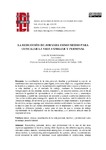Mostrar o rexistro simple do ítem
La reducción de jornada como medio para conciliar la vida familiar y personal
| dc.contributor.author | Munín Sánchez, Lara M. | |
| dc.date.accessioned | 2019-02-14T09:53:47Z | |
| dc.date.available | 2019-02-14T09:53:47Z | |
| dc.date.issued | 2016 | |
| dc.identifier.citation | Anuario da Facultade de Dereito da Universidade da Coruña, 2016, 20: 126-138. ISSN: 1138-039X | es_ES |
| dc.identifier.issn | 1138-039X | |
| dc.identifier.uri | http://hdl.handle.net/2183/21740 | |
| dc.description.abstract | [Resumen] La conciliación de la vida personal, familiar y profesional es una de las manifestaciones más importantes para lograr, entre otros objetivos, la igualdad efectiva de hombres y mujeres, esto es, la participación equilibrada entre mujeres y hombres en la vida familiar y en el mercado de trabajo, mediante la reestructuración y reorganización de los sistemas, laboral, educativo y de recursos sociales, con el fin de introducir la igualdad de oportunidades en el empleo, variar los roles y estereotipos tradicionales, y cubrir las necesidades de atención y cuidado a personas dependientes. Uno de los medios para conseguirlo –aparte de otros muchos- será la reducción de la jornada de trabajo, de tal forma que se pueda acortar el tiempo dedicado a la prestación de servicios, aunque suponga una reducción correlativa del salario. La cuestión es cómo se hace en caso de que existan discrepancias con el empresario y, sobre todo, en qué medida se diferencia jornada y turno, para el caso de que el sistema de trabajo implementado en la empleadora sea de esa naturaleza; y el presente artículo trata de responder al tema. | es_ES |
| dc.description.abstract | [Abstract] Reconciling personal, family and professional life is one of the most important appearance to involve, among other objectives, the effective equality among men and women, namely, balanced share among both of them in family life and in the labour market, by restructuring and reorganization the systems, labour, educational and social resources in order to introduce equal opportunities in employment, change traditional stereotypes and roles, and needs attention and care for dependants. One of the ways to achieve it - apart others - will be the reduction of the working time, so that you can shorten the time spent on the provision of services, although it involves a correlative wage’s reduction. The question is how in the suppose that there are discrepancies with the employer and, above all, the differences between working time and shift work, if this is the implemented way of work at company; and this article tries to respond to this issue. | es_ES |
| dc.language.iso | spa | es_ES |
| dc.rights | Atribución-NoComercial 3.0 España | |
| dc.rights.uri | http://creativecommons.org/licenses/by-sa/3.0/es/ | * |
| dc.subject | Jornada | es_ES |
| dc.subject | Conciliación de la vida personal, familiar y profesional | es_ES |
| dc.subject | Turno de trabajo | es_ES |
| dc.subject | Proceso laboral | es_ES |
| dc.subject | Working time | es_ES |
| dc.subject | Reconciling personal, family and professional life | es_ES |
| dc.subject | Shift work | es_ES |
| dc.subject | Labour process | es_ES |
| dc.title | La reducción de jornada como medio para conciliar la vida familiar y personal | es_ES |
| dc.type | journal article | es_ES |
| dc.rights.accessRights | open access | es_ES |
| UDC.journalTitle | Anuario da Facultade de Dereito da Universidade da Coruña | es_ES |
| UDC.volume | 20 | es_ES |
| UDC.startPage | 126 | es_ES |
| UDC.endPage | 138 | es_ES |






